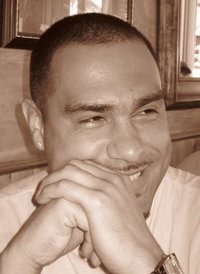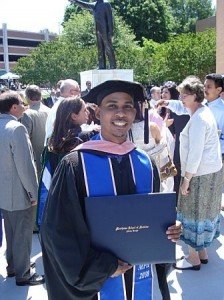An Open Letter to Same Gender Loving Black Men
My heart is heavy. My soul longs for relief. Yesterday my dear friend, mentee and little brother, Warner McGee, transitioned after being taken off life support by his mother due to a protracted illness. The details of exactly which illness robbed him of his future at this point is irrelevant – the painful reality we face is that yet another talented, intelligent brother has left this earth way too soon, leaving many of us scratching our heads in disbelief. What happened? Why him? What more could I have done to prevent this tragedy from transpiring? These questions hauntingly reverberate in my head like a vise, slowly squeezing it until I feel like it will explode.
Warner was young, gifted and black. He overcame many early life adversities to graduate from Morehouse College with both a bachelor’s and a master’s degree in public health. He later went on to get his doctorate in public health from the University of North Carolina-Greensboro. He was brilliant, hardworking and passionate about promoting the general, mental and sexual health of Black men. He was a good friend and a bright spirit. He was a little brother to me. And his story, sadly, is not unfamiliar to us. In recent times, the story of a talented Black same gender loving man being “suddenly” struck down in their prime has become somewhat of a yearly ritual. Word travels through telephone, email and social media. Everyone is shocked, saddened and surprised. And over time, as the details around the death of our brother unravel, we discover that his passing was not so “sudden” after all. There was an underlying medical, mental, spiritual and/or psychological issue at the root of his journey. And for some reason, until it was too late, no one knew about it but him.
For many of us navigating through this world as Black same gender loving men, it is not easy. We have to worry about the inherent racism in general society that pegs us as ubiquitous threats and outsiders, regardless of what we wear or what level of education we have attained. Simultaneously, we are seen as the purveyors of moral depravity in the larger Black community despite our historic and present contributions to our collective advancement. We are seen as the hedonistic pedophiles who do nothing but dream of imaginative ways to corrupt youth; the outcasts who have turned our backs on anything spiritual simply because we respect and acknowledge our natural romantic desires; and of course, we are pegged as the main reason why Black women get HIV at higher rates than women of other races and ethnicities. With all this placed on top of our backs every day in addition to our routine daily struggles, we foolishly spend the majority of our time trying to prove ourselves to our non-Black and/or heterosexual contemporaries. We want them to view us as trustworthy so passionately that we overcompensate with extraordinary creative and work achievements, acquire prestigious work titles and accumulate as many letters behind our names that a business card can possibly handle.
But in the process of responding to this intersectional oppression from being both Black and same gender loving in a society that does not care to feature either social identity, we lose something. We lose ourselves. We stop caring about our needs and instead choose to prioritize the safety and health of others. Over the past decade I have personally witnessed and heard of numerous Black same gender loving men who serve as healers and saviors in our community yet suffer in silence with their own health issues until succumbing to an untimely death. It is unnecessary and I don’t think I can receive another phone call, email, or post on Facebook announcing the death of another Black same gender loving man. I can’t go to another funeral and hear another eulogy that coats over the rich multifaceted nature of our lives to simply relegate them to “He was a good Christian and loved Jesus.” I just can’t.
And I am not just referring to HIV, though I’m sure that is the health issue to cross most peoples’ minds when they think of Black same gender loving men. Contrary to popular belief, we also have to deal with mental health issues, high blood pressure, diabetes, arthritis, and the myriad other maladies that afflict Black men. For some reason, those of us who are the healers in our families, relationships and communities, when afflicted with an illness ourselves, choose to not follow the advice we give so many on a daily basis. We deny the condition exists, fight tooth and nail to avoid medical care and refuse to embrace any homeopathic or medicinal remedies that can facilitate a healthy life. Instead, put quite simply and bluntly, we choose death.
I am not saying that if we are dealing with a specific medical issue, we have to become the spokesperson for that topic. This is not everyone’s calling. In the midst of saving the world and trying to prove our worth to societies that may never fully embrace us, however, we must at least acknowledge our mortality. We cannot always be the Supermen we think we are or so desperately want others to believe. So if you find out you are HIV-positive, you certainly do not have to scream from the rooftops your revelation or become the poster child for HIV treatment or advocacy. But tell some close friends and family that you trust, be conscientious about following up with medical providers, and take care of your body with whatever therapeutic options are available. The same principle applies if we get diagnosed with high blood pressure, cancer, diabetes, depression, or any other medical condition. It is no different. When people know exactly what you are dealing with day to day, things that happen will not be such a “surprise,” but something that makes sense and may facilitate quicker action to remedy the situation.
So why choose a slow protracted death? Can we blame White Supremacy and society’s relentless attack on black male bodies and psyches? Do we point the finger at the pervasive sexual prejudice against anyone not engaging in a “heteronormative lifestyle”? Is it our churches’ fault for trying to brainwash us from a young age that we are damaged goods, or should or biological families assume more responsibility for more easily accepting a heterosexual sibling’s chosen drug problem over our natural romantic inclinations? Is the CDC at fault for ignoring us for years until they couldn’t sweep the statistics under the rug any longer? Or is it our own fault for not taking the time to check on each other when we know that something is wrong? The truth, undoubtedly, is that the intersection of all these factors may contribute to this choice.
Part of the reason why we allow this benign neglect to consume us to the grave, however, is that after years of hearing what we aren’t worth from various sources in our lives, we actually start believing that our lives are expendable – despite ample evidence to the contrary. We are the ones who serve as the rocks of the family. We are the loving dependable uncles to our precious nieces and nephews. We are the sons who pay attention and devote the most time to our aging parents, while our heterosexual siblings complain about being too “busy” with their marriage and kids – as if our lives are devoid of any commitments, responsibilities or obligations outside of ourselves. We are the educators, the lawyers, the public servants, the health care employees, the customer service personnel, the ministers and ministers of music who selflessly devote our lives to our communities every day, while all the while listening to the whispers of disapproval of our born sexuality penetrate the tender flesh of our backs like so many steely knives. After a while, despite these facts, we still believe we are unworthy of love and life.
The solution to this dynamic is clear – we need to be there for each other and stop waiting for a church, the CDC, our local congressperson, or President Obama himself to save us. It is often said that as Black same gender loving men, we get to choose our non-biological families, especially when we encounter challenges with our biological families. If that is the case, we must realize that as with any family, things will not always be perfect. We cherish the moments where we can travel together, go clubbing, or to house parties together, and provide unwavering support to each other through school, work, and relationship difficulties. And there may be times when we may betray each other, say mean spirited things we don’t really mean, and even get on each other’s nerves and have knockdown, drag out arguments for the ages. But this is the case with every family, biologic and non-biologic. So since we have chosen each other, we must honor ourselves and our chosen family through thick and thin, through good times and bad times, through sickness and health. And yes, ‘til death do us part.
So wherever you are, whatever you are doing in the course of your busy day that may involve interacting with another Black same gender loving man, look into his eyes and gaze into his soul. See yourself in him. Whether he is a friend, lover or family member – look through the perfectly faded hair, the letters behind his name, the designer clothes, the impeccable payment record of his rent or mortgage or whatever kind of car from which he emerges to greet you. Look past any troubles he has paying bills, quirks in personality or annoying habits. Look through him and simply take a moment to ask him if he is ok. And if he gives you a dismissive answer like “I’m fine,” ask him again, and with the side-eye you usually reserve for giving shade, let him you know are serious. Then stand back and be prepared for a more elaborate and real answer than you could have ever anticipated. And when you are finished listening to him, wrap him in your arms and tell him that you love him. It may be the last time you get the opportunity to do so, and it may be one of the few times he will hear those three words and know that it is coming from someone who truly understands him. And maybe, just maybe, he will come to realize that he has another choice.
____________________________________________
 David Malebranche, MD, MPH, is currently a Primary Care Physician at the University of Pennsylvania’s Student Health Center. Since 2001, David has been providing clinical care to HIV+ patients, and is also an experienced qualitative HIV behavioral prevention researcher, exploring the social and structural factors influencing the sexual health of Black men in the United States. Dr. Malebranche’s work has been featured in several medical and public health journals, and he is known as a dynamic speaker nationwide on the subject of HIV/AIDS in the Black community. He can be reached at [email protected] or http://works.bepress.com/david_malebranche,
David Malebranche, MD, MPH, is currently a Primary Care Physician at the University of Pennsylvania’s Student Health Center. Since 2001, David has been providing clinical care to HIV+ patients, and is also an experienced qualitative HIV behavioral prevention researcher, exploring the social and structural factors influencing the sexual health of Black men in the United States. Dr. Malebranche’s work has been featured in several medical and public health journals, and he is known as a dynamic speaker nationwide on the subject of HIV/AIDS in the Black community. He can be reached at [email protected] or http://works.bepress.com/david_malebranche,





16 Comments